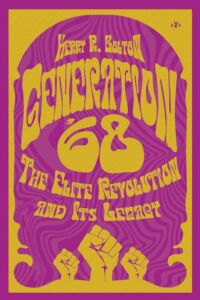Communist Barbarism in Hungary — and America Today: When Israel Is King

You can buy the book When Israel Is King here.
1,303 words
Jerome & Jean Tharaud
When Israel Is King
Allentown, Penn.: Antelope Hill, 2024
First published by Robert M. McBride & Company in New York, 1924
Shortly after the First World War, Hungary was forced to endure a Jewish-led Communist government that turned the Central European nation into a mix of today’s occupied Palestine and Pol Pot’s Cambodian dystopia. How this occurred is described in a 1924 book that was recently republished by Antelope Hill, When Israel Is King.
Hungary is on the western border of the Eurasian Steppe, and consequently its history has been one of invasions from the East. The people of this land call themselves Magyars, after a tribe from the Eurasian Steppe who spoke a Uralic language that arrived in the Carpathian Basin in the ninth century. By 1000, the Hungarians had converted to Christianity and the fortification at Buda, the western half of modern Budapest, became a hilltop bulwark protecting all Western Europe against invasions from the East.
Invasions still came, of course. The invasions of the Ottoman Turks depopulated much of Hungary. From the sixteenth century, Hungary was incorporated into a larger empire — the Habsburg Empire, which in 1867 became the Austro-Hungarian Empire. The Empire governed large areas of Central and Eastern Europe, and with the establishment of the dual monarchy, the Hungarian government had equal power with the Habsburgs over foreign and military affairs.
Jews moved into the region from the East in the late nineteenth century. Once in Hungary, they used their collective financial power to buy up real estate from minor Hungarian landowners, and a large amount of the population took up residence in Budapest. For a time, all seemed well. There were no problems between Jews and Magyars. In fact:
The Jews [were] happy to find a hospitality in Hungary which opened to them so easy an entrance to the nations of the West, endeavored to become more Hungarian than the Hungarians themselves. They adopted their language, their manners, their sentiments, even their patriotism, with that excessive ardor which is so characteristic of their race. Many of them, indeed, was sincere. (p. 20)
Then came the First World War. Hungary’s greatest statesman during the conflict was Count István Tisza (1861-1918), who was elected Prime Minister in 1914. Count Tisza was not a particularly popular figure in Hungary, but rather a wise one who carefully navigated both his career and his country through the tumult of the Austro-Hungarian Empire’s fractious domestic politics during wartime.

You can buy Kerry R. Bolton’s book Generation ’68 here.
After the heir to the Austro-Hungarian throne, Archduke Franz Ferdinand, was assassinated by a Serbian separatist, the Imperial government was uncertain how to respond, Count Tisza urged a more cautious course of action than what ended up being taken. In 1917, when the war was going badly for the Empire, Tisza resigned as Prime Minister and joined the army as a Colonel. Days before the Armistice was signed in November 1918, Tisza was assassinated at his home by angry soldiers who blamed him for the disaster of the war.
The Austro-Hungarian Empire was dissolved in October 1918 and Hungary became an independent republic with ill-defined borders and an unstable domestic political system. Mihály Károlyi (1875-1955) became the new republic’s Prime Minister and made efforts to convince the Allies to make a separate peace with Hungary, as though Hungary had been an occupied nation rather than the critical partner that it was during the Austro-Hungarian Empire. Károlyi had the returning soldiers disarmed in an attempt to appease the vengeful Allies, but this left the country vulnerable to the machinations of the Romania and Czechoslovakia, who were asserting their sovereignty within the vacuum that had been left by the collapse of the Empire. Károlyi’s decisions likewise left Hungary exposed to the predations of the local Jews.
One such Jew was Béla Kun (1886-1938). He had been a journalist before the war, but served in the Hungarian army during the conflict. He was captured by the Russians and sent to Siberia, where he became embroiled with the Bolsheviks. When the Russian Civil War broke out, he fought on the Communist side. He returned to Hungary with other Communists, as well as the backing of the Soviet government, immediately after the Armistice in November 1918 and established a Communist movement there.
In February 1919, Kun and his supporters attacked the office of a socialist newspaper, resulting in several injuries and deaths, including among policemen. Kun was arrested and imprisoned. Károlyi was soon faced with a revolution, however, due in no small part to the inability of the Allies to put in place a structure that could justly address the concerns of the peoples of the defeated Empire. For Hungary, this meant losing over two-thirds of its territory, which stranded millions of ethnic Hungarians in other nations.
The Hungarian government had grown so desperate by this point that they believed that bringing the Communists into the government would win the support of the Soviet Red Army, which could then intervene to defend Hungary’s interests. The Hungarian Soviet Republic was proclaimed in March 1919 and Kun was promptly released from prison. Officially, Kun was only the People’s Commissar for Foreign Affairs rather than the head of state, but in reality all power rested with him. At least 30 out of the 48 commissars in the new government were Jews.
Hungary’s economy was reshaped in keeping with Communist ideals, and business was essentially shut down. In rural Hungary, Communist gangs called “Lenin’s boys,” often made up of Jews, stole food and killed anyone they wish. Meanwhile, in the interest of expanding the Communist revolution, Kun attempted to expel the Czechoslovakians and Romanians from the formerly Hungarian areas by raising a Hungarian Red Army led by Colonel Aurél Stromfeld. Stromfeld is the perfect example of the limitations of the military mind. As the Tharauds write:
[Stromfeld] disappointed [all of Hungary’s political factions] — the Bolshevists, because he did not succeed in leading them to victory, and the Patriots because they had not understood that for this professional soldier the post of chief of the general staff, which had been given to him was the goal of the ambition, and that he saw nothing beyond it. (p. 152)
Kun’s Jewish-led government didn’t only kill Hungarian peasants, of course. Israel Is King details the summary arrests and murders of Hungarians of all types. Kun also drained the Hungarian treasury in order to fund Communist agitation across Europe. His government fell after only four months when his army was crushed by the Romanians. Kun fled for the Soviet Union, where he continued to work for Communist revolutions in other parts of Europe. His revolutionary career ended when he was executed as part of Stalin’s Great Purge in 1938 after being accused of being a Trotskyite.
Following months of brutal repression, the Hungarian people rallied after the fall of the Soviet Republic. Militias were formed, many of which were led by men who had been officers in the Austro-Hungarian military, and they quickly moved to end Jewish power in Hungary. Anti-Jewish feeling was widespread and strong; the book describes a Jew being violently expelled from a shop by a mob. Many Jews in Hungary either quickly converted to Christianity or else were rounded up and kept in train yards, where they lived in freight cars. No other European country was willing to take in such a large number of Jews from Hungary, however.
The book concludes with a hypothetical discourse between Jews and European Christians over their different cultural natures. These insights alone are worth the price of the book. In When Israel Is King, we see many things that are reminiscent of America’s current problems: poor economic decisions, a vengeful minority with the power to create a two-tiered justice system, an ineffective military, insecure borders, and excessive cruelty to the peoples of the hinterlands. Moreover, we are witnessing an even more vicious type of the same cruelty exercised by Béla Kun in occupied Palestine today.



